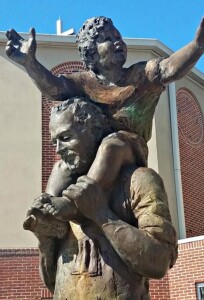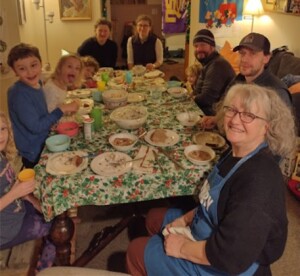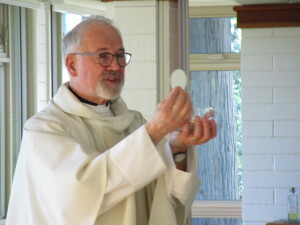We have a new house guest, Joseph of Nazareth!
Some of you might recall that on December 8, 2020, Pope Francis invited Catholics and Christians everywhere to participate in a year of honoring of St. Joseph, father to Jesus and spouse of Mary. He wrote,
“Each of us can discover in Joseph — the man who goes unnoticed, a daily, discreet and hidden presence — an intercessor, a support and a guide in times of trouble…St. Joseph reminds us that those who appear hidden or in the shadows can play an incomparable role in the history of salvation.”
We took this invitation to heart and created a St. Joseph version of The Angelus. Many of you know the Angelus as a Marian devotion that recounts Mary’s “fiat,” (Latin for “let it be done”), her “yes” to God. Mary’s “yes” resulted in the birth of Jesus as told in the Gospel of Luke.
We modeled our prayer off the Marian Angelus to tell the story of Joseph’s “fiat,” his “yes” to God, which was the necessary compliment to his wife’s fiat. The prayer (see below) begins with a Scripture verse and concludes with a prayer to St. Joseph that I modeled off a prayer that Pope Francis had written.
St. Joseph’s silent and courageous “yes” to God, as told in the Gospel of Matthew, shaped the rest of his life. He took in his pregnant wife, thus preventing, at worst, her death by stoning and, at best, the humiliation of an out-of-wedlock pregnancy. He had to protect his wife and child from the evil intentions of King Herod and guide his family to safety in Egypt. He provided for them in this foreign land where they lived as refugees, not unlike the millions of refugees fleeing violence and poverty today; and, when it seemed safe to do so, he returned with them to their extended family in Nazareth.
We also know from Jewish culture that it was Joseph’s task to teach his son the responsibilities of every Jewish man: to learn Torah and follow its teachings, and to learn a trade.
During the Holy Year of St. Joseph, we prayed the St. Joseph Angelus daily at noontime. An unexpected bonus was that this daily prayer nurtured in us a deeper love and relationship (devotion) to St. Joseph. Previously, the only time that we gave St. Joseph much thought was on March 19th, the Feast of St. Joseph, and this was because we Sicilians look to him as the patron saint of our ancestral island (my grandparents were from Sicily). St. Joseph Day in the United States became the Italian version of St. Patrick’s Day for the Irish. It was a day to celebrate Italian cooking and the memory of our ancestors who made the journey across the Atlantic to settle in America.
Praying the St. Joseph Angelus changed that. It caused us to pause, stop the busyness of the day, and remember how God loves us so much that God sent his beloved son Jesus into the world not to condemn it, but to save it (John 3:16). The Incarnation of the Son of God would not have happened without the cooperation of both Mary and Joseph, who both said “yes,” who both guided their son in the ways of God. We grew to love St. Joseph. And then, he came to visit our home in a formal way through the image of a sacred ICON.
![]() In October, 2019, Lori and I did a pilgrimage walk from Florence to Assisi on the Way of St. Francis (called the Via Francigena). In Assisi, we met a young Italian couple, newlyweds Romina and Fabio. We had dinner together, heard the story of their engagement and marriage, and exchanged e-mail addresses. During the pandemic Romina trained to be an iconographer, which is described as a “writer” of icons because she places the Word of God in art form on a piece of wood. She prayed, fasted, and wrote the image of St. Joseph for her first icon. It was so beautiful! After we saw a photo of it on social media, we ordered the one pictured here. The real icon was even more beautiful than the photo conveyed.
In October, 2019, Lori and I did a pilgrimage walk from Florence to Assisi on the Way of St. Francis (called the Via Francigena). In Assisi, we met a young Italian couple, newlyweds Romina and Fabio. We had dinner together, heard the story of their engagement and marriage, and exchanged e-mail addresses. During the pandemic Romina trained to be an iconographer, which is described as a “writer” of icons because she places the Word of God in art form on a piece of wood. She prayed, fasted, and wrote the image of St. Joseph for her first icon. It was so beautiful! After we saw a photo of it on social media, we ordered the one pictured here. The real icon was even more beautiful than the photo conveyed.
Icons in Christian history, especially in the Eastern Church, are like sacraments. They are not merely artwork to admire. They are divine images that help us encounter the presence of God through prayer, meditation, and veneration. The St. Joseph ICON sits on our table, and in a beautiful way known only to God, we not only sense the divine presence as we pray before this image, but we can also feel the masculine presence of Joseph, husband of Mary, and father to Jesus.
We have several “copies” of icons in our home, images taken from photos and placed on wood. They are lovely and help us in our prayer. The St. Joseph ICON is our first original ICON, created by Romina, after she trained in the ancient custom of iconography, and spent time in prayer and fasting. We felt great joy as we welcomed “St. Joseph” into our home.
I encourage you to include the Angelus, in either its Marian or Joseph form, in your prayer. You can access copies of this from our blog at http://www.catholiclifeministries.org/2022/10/10/the-marian-angelus-and-the-st-joseph-angelus/
Allow it to help you welcome both the mother of Jesus and the father to Jesus into your home. You might even consider commissioning Romina to write an ICON for you, one of Jesus, St. Mary, St. Joseph, or a favorite saint (I can give you her contact information)!
Glory be to God, we have a new guest in our home – St. Joseph.
A Homespun Homily by Lori: Post Office Prodigals
By Lori Fontana
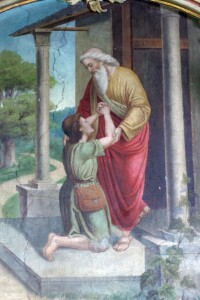 Our recent Sunday Gospel was the story of the Prodigal Son. Often the homily for this Scripture story focuses on the question – “Which character in the story do you relate to?” Would I be the prodigal, the older brother, the father?
Our recent Sunday Gospel was the story of the Prodigal Son. Often the homily for this Scripture story focuses on the question – “Which character in the story do you relate to?” Would I be the prodigal, the older brother, the father?
Truth be told, I’d probably be the “older brother,” who says to his father, “All these years I served you and not once did I disobey your orders: yet you never gave me even a young goat to feast on with my friends.” [Luke 15:29]
I’m the oldest of nine children, the oldest daughter, the older sister – very much the “go-along, get-along” type and so responsible. I follow the rules, and I have high expectations that others will do the right thing too.
That’s why a recent visit to the post office was so challenging. I arrived at our neighborhood post office mid-day, with my package ready to mail. It was neatly wrapped in brown paper, taped with mailing (not Scotch) tape, address written clearly with black Sharpie and the return address affixed in the upper corner. In other words, my box was completely ready to hand to the postal clerk for mailing.
As always, there was a line. As always, there were only two clerks working, though there are four customer windows. At the one window, a young lady was insisting that she was supposed to be picking up a package here. The conversation went back and forth for 5 minutes until finally the young customer held up a message on her phone. “Oh!” exclaimed the clerk. “You want UPS, not USPS. We’re the Post Office – USPS. There is a UPS store down the street.” The confused customer hurried away.
At the other open window, a young woman brandished a “Package Delivery” notice left at her address just that morning. She wanted to pick up the package NOW; it was medication, she insisted. The clerk, with great patience, repeated over and over that the package was not there as it was still with the mail carrier out on his route. This was a Saturday morning. The package wouldn’t be available for pick-up until the following Tuesday because the office was closed on Sunday, and Monday was a holiday. So…Tuesday. “I’m sorry,” said the clerk. The young woman stomped away, huffing and puffing her displeasure.
“Next,” chirped the clerk. The customer stepped forward. “Excuse me,” she said. “Do you have a pen?” The clerk handed her a pen, and the lady proceeded to scroll through her phone, mumbling, “I have the address here somewhere.” Then she laid her box on the counter and began to address it. The clerk waited a few seconds and then politely asked the customer to move to the side to finish addressing her package.
handed her a pen, and the lady proceeded to scroll through her phone, mumbling, “I have the address here somewhere.” Then she laid her box on the counter and began to address it. The clerk waited a few seconds and then politely asked the customer to move to the side to finish addressing her package.
“May I help the next person?” the clerk sang out. This time it was an older gentleman with a large box, open at the top to reveal several spray-type bottles. “I need to ship these cleaning supplies,” the man remarked. The clerk, patient as ever, replied, “It looks like you need a bigger box. Also, what exactly is in these bottles?” There ensued an extended back-and-forth conversation about the bottle contents, the size of the box, the restrictions on sending certain substances via mail, and so on and so forth.
Meanwhile, those of us waiting in line were growing restless. As I surveyed this scene, clutching my well-prepared package, I couldn’t help but think of the wayward prodigal and his smug older sibling; and I laughed. Clearly, these folks were my Post Office Prodigals, unprepared and uninformed. Either they didn’t know or they didn’t care that the post office has rules that need to be followed. Clearly, I was the older brother – I came prepared, I knew the rules and followed them. My package was good to go. Yet I had to wait in line with everyone else.
How these folks even dared show their faces and their packages here was a mystery to me.
The lesson for me was crystal clear: just like the older brother, I was feeling self-righteous because MY package was “right,” and all these others had done it “wrong.” Yet these kind postal clerks were serving each customer, ready or not, with respect and patience. Truly, these two busy clerks were the welcoming ones, just like the father in the story.
It’s so easy to see with eyes of judgment, to look around and feel superior. But who am I to judge? The larger truth is that we are all prodigals in some way. And we all long for someone to be patient with us, to gently lead us in the right direction, as the clerks did with each customer.
 No matter how you see yourself in the story of the Prodigal Son, the truth remains: God loves each one of us fully, completely, just as we are. The clerks treated me just the same as they treated each person in line. God doesn’t love me any more or any less because of how I wrap a package for mailing. God says to each one of us:
No matter how you see yourself in the story of the Prodigal Son, the truth remains: God loves each one of us fully, completely, just as we are. The clerks treated me just the same as they treated each person in line. God doesn’t love me any more or any less because of how I wrap a package for mailing. God says to each one of us:
“My child, you are here with me always; everything I have is yours.” [Luke 15:31]
A Homespun Homily by Lori: Let’s hear it for the family meal!
As Robert is presenting his ideas for a revitalization of Sunday Mass, I’d like to propose the rejuvenation of the family meal. I think there is a parallel here – Sunday Mass is the meal of our faith community, to encourage and build up our faith family. The family meal nourishes each of us, body and soul.
The fast pace of modern life has eroded the family meal. Long hours at work or school; rushing here and there for a myriad of hobbies or extracurricular activities; pressure to do more, see more, work more, play more – there just aren’t enough hours in the day! The pandemic may have slowed our pace of life temporarily, but I have the sense that in 2022, we’re revving back up to speed and perhaps moving even faster because of being pent up during Covid.
The family meal requires planning and commitment. It requires coordination of schedules, give and take, patience, compromise, compassion, and first and foremost, TIME!…which is in very short supply these days. It’s hard to get buy-in from all family members. There will always be something else to do, somewhere else to be, for at least one person in the family. But I think the effort to eat together is so valuable that it is worth the hassle of making it a family priority. Parents, your kids probably won’t jump for joy if you require them to be at a nightly meal. But press on; persevere. The rewards are worth it.
A report in Child Health News, October, 2011, states that with as few as three family meals a week, there was a 12% decrease in childhood obesity. Eating healthy foods increased by 24%, and eating unhealthy foods decreased by 20%. Eating disorders such as anorexia nervosa, decreased by 35%. When children eat meals with their parents, they are less likely to smoke, drink, or use other drugs. More frequent family meals also correlated to children’s greater success in school and better communication skills. The family meal doesn’t solve all problems or guarantee perfect children, but it does provide a regular and dependable nurturing environment in which children can grow and feel loved and cared for.
Even with a houseful of kids (we had six!) and Robert’s unusual work schedule (working many evenings and weekends), we made our family dinner a priority. We had to make some unpopular adjustments – each of our kids was limited to one sport or extracurricular activity at a time. Then we planned around their practice schedules. We talked about our plan each week and expected Dad and Mom and all the kids to be at the supper table at the appointed time. I was a home mom for most of the time we raised our children, so I could cook and carpool and help with getting everyone here and there and home again in time to eat together. Of course, there were times when someone could not be there. This was the exception, though. There was some complaining, but we all showed up, almost all of the time.
The children helped by setting the table, grating cheese or chopping carrots, filling water glasses, playing with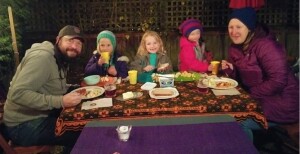 the baby so I could finish meal prep. If Robert was home before dinner, he would help cook or entertain the little ones – his specialty! Our meal had a routine – we sang grace, served the food around, and then we asked each one to share three good things about their day, and one challenge or “bad thing.” Now with eight people, that’s a lot of “things” to hear about! Some of us were succinct – “good things” – boom, boom, boom. And “not so good” – boom! Next!
the baby so I could finish meal prep. If Robert was home before dinner, he would help cook or entertain the little ones – his specialty! Our meal had a routine – we sang grace, served the food around, and then we asked each one to share three good things about their day, and one challenge or “bad thing.” Now with eight people, that’s a lot of “things” to hear about! Some of us were succinct – “good things” – boom, boom, boom. And “not so good” – boom! Next!
Other of us (no names mentioned) offered more detail. After one child’s 10-minute description of a happy school event, a sibling sighed, “And that was just first period!” There was laughter and occasionally tears; there were words of encouragement and impatient grunts. But what awesome learning occurred – in communication, listening, patience, empathy – great skills for life. Even our dog Ellie cooperated with the family meal. She sat patiently a few feet from the table as we ate, only getting up when we sang our prayer after the meal.
Our kids joke and laugh now about our family dinners. But our memories are mostly good. And each of our children is a great communicator, plus they are honest, forthright, caring and compassionate, and they are outstanding listeners. They were trained by the best – their many siblings!
Jesus gives us inspiration for the family meal. So many of the Gospel stories involve a meal. Here are a few:
Matthew 9 – Jesus eats with tax collectors and sinners, and he tells the Pharisees, “Those who are well do not need a physician, but the sick do.”
Luke 7 – The dinner at Simon’s house and the repentant woman who washes Jesus’ feet with her tears
Luke 15 – The Prodigal Son and the feast his father throws for him when he returns
John 12 – Dinner with Martha, Mary, and Lazarus
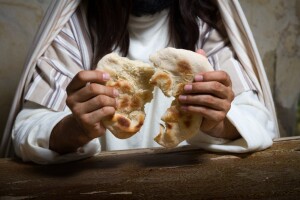 Matthew 26, Mark 14, Luke 22, John 13-14 – The Last Supper
Matthew 26, Mark 14, Luke 22, John 13-14 – The Last Supper
And finally, in John 21, the resurrected Jesus calls to his disciples from the shore of the Sea of Tiberias, “Come, have breakfast.”
One more thought: for the years our children were home, on Saturday evenings we celebrated a Christian Sabbath meal. We read the Sunday Scripture readings and shared a blessing cup / thanksgiving cup. It was good preparation for celebrating with our faith family the next day at Sunday Mass.
At whatever stage your family is, a regular family meal can be a blessing. Perhaps you can eat together five nights a week; maybe only on weekends. That’s okay. Do what works for your family. Maybe your family is “empty nesters” as ours is, or perhaps you live alone.
Robert and I eat as many meals together as we can; and we look for opportunities to include family, friends, and neighbors. Whatever your family situation, the “family meal” is lovely and life-giving and certainly worth the effort.
(Keeping the family meal alive during the pandemic with a winter-time meal outside.)
Sunday Mass needs some tweaking
There is a battle going on in the Catholic Church between the Pope who wants to inspire Catholics to a deeper experience of God in the Mass of Vatican II and traditionalists who want to hold on to the Latin and pre-Vatican II Mass of the 1950’s, inspired by the Council of Trent (1545-63). I am with Pope Francis. Let’s let go of the old rite and its overemphasis on ritual and the exaggerated role of the priest; let’s embrace the Vatican II rite that is in a language people understand and situates the priest within the community of believers who together pray the Mass. Yes, the priest consecrates the bread and wine into the body and blood of Jesus, but together we celebrate and pray the Mass in Word and Sacrament.
I am sympathetic to a traditionalist’s critique of the Vatican II liturgy: the changes of Vatican II have caused the Mass to lose its sense of mystery, its culture of encounter with the divine. I somewhat agree; but I don’t think a return to the pre-Vatican II Mass is the answer. As I see it, Catholics are hungry for community; and the Sunday Eucharist has evolved to meet that relationship need. Prayer, both personal and communal, can seem to get lost. I get it; intimacy and communion with God is lacking.
What to do? Here’s what I think.
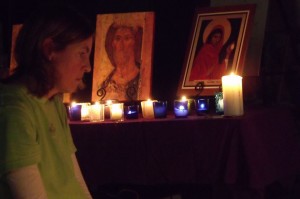 Quiet, sung prayer before Mass. 10-15 minutes before Mass begins, let worship begin with simple, repetitive sung chants. Chants from Taize in Latin or English would be perfect for this, e.g. Jesus, remember me… Children can be included by teaching them simple hand motions to these chants. Sing the Psalm response for that day’s liturgy; it can help the faith community to learn it and participate more fully during the Mass. (If your parish has a vibrant singing history, use the songs the people know.)
Quiet, sung prayer before Mass. 10-15 minutes before Mass begins, let worship begin with simple, repetitive sung chants. Chants from Taize in Latin or English would be perfect for this, e.g. Jesus, remember me… Children can be included by teaching them simple hand motions to these chants. Sing the Psalm response for that day’s liturgy; it can help the faith community to learn it and participate more fully during the Mass. (If your parish has a vibrant singing history, use the songs the people know.)
Process with the Gospels. The priest ought to begin Mass at his chair, greet the people, and invite all to stand and welcome the Book of the Gospels as it is processed into the church. There is no need for the priest to process into the church like a European monarch with his ministers in tow, the model upon which the current Mass procession is based.
Sunday Mass has too many readings! Three readings and a Psalm response are too much for one person to present in a homily and too much for the people to grasp. Especially when children are present, the presider ought to have the option of dropping the second reading. which often does not relate to the Gospel. Sing the Alleluia both before and after the proclamation of the Gospel to draw the congregation back into full and active engagement.
Focus preaching. Again, as a rule, there are too many readings for the priest or deacon to preach on effectively. The homilist ought to focus on one reading and really work it, sometimes line-by-line, to draw out its meaning for the time it was written and its relevance for us today. 10-12 minutes is all that the homilist needs to give the congregation the one or two points that he wants them to remember. And please, homilist, if there are children and youth present, direct your comments to them. Then let there be a time of silence following the homily.
Preaching teams. Why not identify preaching talent among the lay women and men ofthe parish and bring their wisdom to bear during the Sunday homily? According to the rules of the liturgy, the priest/deacon can invite anyone to help him in his duties to preach the Word of God. (I was part of a preaching team at my former parish in West Seattle.)
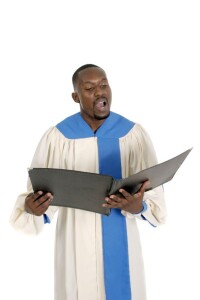 Sing the Creed! In the ebb and flow of the Mass, the reading of the Scriptures followed by the preaching of the homily are the most passive times for the congregation. Reading / reciting the Creed does little to draw the congregation into the Mass. LET’S SING IT! Or let us sing a refrain, with a cantor singing the words of the creed. The most participatory singing at Mass is not usually with the choir hymns, but with the parts of the Mass (Holy, Holy; Lamb of God; Alleluia; Amen, Our Father) that all the people know by heart. Let’s sing the Mass, including the Creed!
Sing the Creed! In the ebb and flow of the Mass, the reading of the Scriptures followed by the preaching of the homily are the most passive times for the congregation. Reading / reciting the Creed does little to draw the congregation into the Mass. LET’S SING IT! Or let us sing a refrain, with a cantor singing the words of the creed. The most participatory singing at Mass is not usually with the choir hymns, but with the parts of the Mass (Holy, Holy; Lamb of God; Alleluia; Amen, Our Father) that all the people know by heart. Let’s sing the Mass, including the Creed!
Find a prayerful way to involve the children. Have them lead a part of the Mass such as the Eucharistic Acclamation or the Lamb of God and include sign language. This is not a performance. Children leading songs with accompanying hand motions can be intensely prayerful.
Quiet prayer after communion. As communion ends, please, don’t miss this time of prayer and intimacy by watching the presider wash the sacred vessels (chalice and paten). Move the washing of vessels to after Mass. The time after communion is an important time when the music minister or priest presider can invite each person to draw close to Jesus who has just given himself to all in the Eucharist. Repeat a simple Taize chant, the Psalm response, or a familiar refrain like “Shepherd me, O God…,” for the next 2-3 minutes. Some parishes sing the Anima Christi (Soul of Christ, sanctify me…).
Closure. This is a good time for announcements, to welcome newcomers, and to remind all that the Lord Jesus is with us right now to help us go forth to be the Good News in the world.
Sunday Mass is the ordinary place where Catholics gather to encounter the risen Jesus present in one another, the proclamation of the Word, and the reception of the Eucharist. Other opportunities need to be developed to assist parishioners to socially connect with one another. Some simple changes can help this happen.
Join us for our fall retreat, The Spiritual Journey: A Pilgrimage into the Heart of God
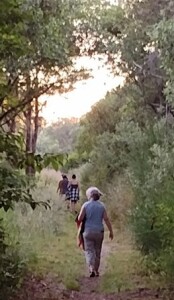 The Spiritual Journey: A Pilgrimage into the Heart of God
The Spiritual Journey: A Pilgrimage into the Heart of God
Life is a journey, not simply from childhood to adulthood and moving on to old age. It is a spiritual journey, a pilgrimage from the necessary egocentric state of childhood, where we learn to navigate the emotional minefields of our families, towards the all embracing heart of God where we learn the deepest truth of our existence: we are God’s beloved daughters and sons. And there is nothing that we can do, no matter how bad, to change that. Nor is there any good we can do to enhance that truth, to make us somehow even more beloved. God loves each one of us as much as God loves Jesus.
Join us for The Spiritual Journey: A Pilgrimage into the Heart of God. We will explore this deep truth of being God’s beloved from the moment of our conception, how life obscures this truth, and how the spiritual journey allows our belovedness in God to break through and blossom.
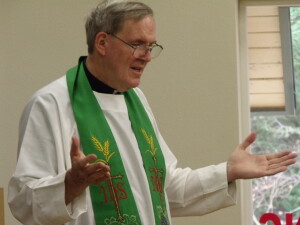 Fr. Dennis Berry, ST, a familiar face to the CLM community, will be one of our presenters along with Robert Fontana. Fr. Dennis has presented at many retreats and family camps for CLM. He is a priest of the Missionary Servants of the Most Holy Trinity. Most recently, he was the director of the Shrine of St. Joseph in Stirling, NJ; and now he is in Senior Ministry and lives in Chicago where he accompanies young men in preparation for the missionary life. He is also involved in giving retreats, workshops, and spiritual direction. Ordained in 1974, he holds a doctorate in spiritual theology and has worked throughout the United States and Latin America. He also served ten years as the international spiritual guide for the lay missionaries of the Missionary Cenacle Apostolate and eight years as a Councilor General of his congregation. He has written extensively and developed retreats and spiritual exercises based on the life and spirituality of Father Thomas Judge, founder of the movement of lay missionaries, sisters, brothers and priests called the Missionary Cenacle Family.
Fr. Dennis Berry, ST, a familiar face to the CLM community, will be one of our presenters along with Robert Fontana. Fr. Dennis has presented at many retreats and family camps for CLM. He is a priest of the Missionary Servants of the Most Holy Trinity. Most recently, he was the director of the Shrine of St. Joseph in Stirling, NJ; and now he is in Senior Ministry and lives in Chicago where he accompanies young men in preparation for the missionary life. He is also involved in giving retreats, workshops, and spiritual direction. Ordained in 1974, he holds a doctorate in spiritual theology and has worked throughout the United States and Latin America. He also served ten years as the international spiritual guide for the lay missionaries of the Missionary Cenacle Apostolate and eight years as a Councilor General of his congregation. He has written extensively and developed retreats and spiritual exercises based on the life and spirituality of Father Thomas Judge, founder of the movement of lay missionaries, sisters, brothers and priests called the Missionary Cenacle Family.
Saturday, October 8, 9:30 am – 5 pm
Peace & Spirituality Center, St. Mary-by-the-Lake
¨ Address: 1663 Killarney Way, Bellevue, WA
¨ Cost: $20 (single), $35(couple) / Scholarships available.
¨ Please bring your own brown bag lunch.
¨ Snacks/drinks will be provided.
¨ To register: Email: Robert@catholiclifeministries to sign up. Pay registration fee online at catholiclifeministries.org/donate/ OR bring a check to the retreat, payable to CLM.
¨ The Spiritual Journey will conclude with Mass!
A letter to the brave woman who washed Jesus’ feet with her tears
“A Pharisee invited him to dine with him, and he entered the Pharisee’s house and reclined at table. Now there was a sinful woman in the city who learned that he was at table in the house of the Pharisee. Bringing an alabaster flask of ointment, she stood behind him at his feet weeping and began to bathe his feet with her tears. Then she wiped them with her hair, kissed them, and anointed them with the ointment.” Luke 7:36-38
Dear Brave Woman,
I have read your story repeatedly, over many years, and I continue to be amazed by your actions. You knew that you were not welcome in the house of Simon the Pharisee. You knew what he thought of you, that you were “human trash,” and not worthy to step into his home. In fact, you believed these things about yourself as well. You internalized the judgments of proper society and agreed with their judgment: that you were a “sinful woman.” Yet, you did something absurd. You crashed a dinner party without considering the consequences, because you were sure that there was one person present, Jesus, who would not reject you. You knew that he would not misunderstand your actions.
How did you know this? You had not met him before. How had you come to know that Jesus would receive your tears and tender touches with compassion and humility?
I am assuming from the story that you lived a life of hurt and sorrow inflicted by the hands of men. Childhood physical and sexual abuse are epidemic in my century. Was it the same in yours? Did you suffer trauma at an early age and then never knew how to feel safe and secure in the world? Did you act out, seeking security and love in the only way you knew: by offering yourself to men? You fell into the trap of being trafficked for the sexual pleasure of men. That’s what the Scriptures imply with your description as “a sinful woman.” You were trapped between the misuse and abuse from men of the world and the scorn and judgment from men of faith.
 But in Jesus you found someone different. Somehow, as you learned about him, as you learned from others how he interacted with tax collectors, prostitutes, and other public sinners, you understood that he came as a friend, not as a judge.
But in Jesus you found someone different. Somehow, as you learned about him, as you learned from others how he interacted with tax collectors, prostitutes, and other public sinners, you understood that he came as a friend, not as a judge.
However you came to know about Jesus, you grasped his radical message. Before you ever met him, you came to understand that God didn’t hate sinners. In fact, the opposite was true: God fully understands the pain and suffering that is so often behind a person’s self-destructive behavior. God comes to the sinner with infinite mercy and forgiveness. You followed Jesus from a distance, and his words melted your heart, melted your self-judgment, and revealed to you your deepest truth: that you are God’s beloved daughter! And nothing you have done, no sin, no self-condemnation, no self-harm, no addiction, can change that. Jesus brought to you the infinite love and mercy of God, and you were overwhelmed with gratitude.
When you learned that he was at the house of Simon the Pharisee, you could not help yourself. Your gratitude for what Jesus had done for you burst forth in tears that washed his feet and kisses that covered them with love. You did what few people ever did: you surprised Jesus, and he was amazed at your extravagant display of affection. When he spoke to Simon, he compared Simon’s lack of hospitality with your generosity:
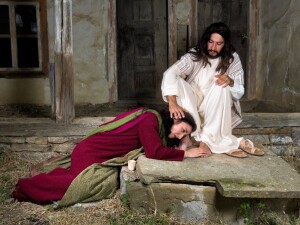 “Do you see this woman? When I entered your house, you did not give me water for my feet, but she has bathed them with her tears and wiped them with her hair. You did not give me a kiss, but she has not ceased kissing my feet since the time I entered. You did not anoint my head with oil, but she anointed my feet with ointment. So I tell you, her many sins have been forgiven; hence, she has shown great love. But the one to whom little is forgiven, loves little.” Luke 7:44-47
“Do you see this woman? When I entered your house, you did not give me water for my feet, but she has bathed them with her tears and wiped them with her hair. You did not give me a kiss, but she has not ceased kissing my feet since the time I entered. You did not anoint my head with oil, but she anointed my feet with ointment. So I tell you, her many sins have been forgiven; hence, she has shown great love. But the one to whom little is forgiven, loves little.” Luke 7:44-47
I do not know your name, but I ask you, Brave Woman, to pray for me that I can be like you and allow the forgiveness of God to free me so that I, too, can shower Jesus and others, with “great love.”
Sincerely,
A sinner struggling to be a saint
Homespun Homily by Lori: The Grace of Listening
By Lori Fontana
Who listens to you? I mean, really listens. Who gives you total attention as you speak, letting you pause to gather your thoughts or search for just the right word to express what is rattling around in your head or flowing from your heart? If you have such a person in your life, an attentive listener, you, indeed, have a great gift.
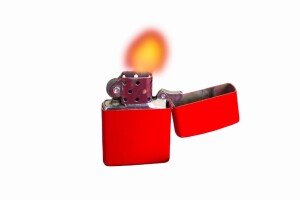 Here’s a true story. An older couple we knew many years ago were empty-nesters. Their daily routine included sitting down together for every meal. However, whereas the wife was talkative and brimming with conversation, the husband wanted to read the newspaper in silence. The wife was miffed and tried for months to get the husband’s attention and participation without success. One morning at breakfast, when she could stand her husband’s lack of engagement no longer, she leaned over and, with a small lighter, lit his newspaper on fire.
Here’s a true story. An older couple we knew many years ago were empty-nesters. Their daily routine included sitting down together for every meal. However, whereas the wife was talkative and brimming with conversation, the husband wanted to read the newspaper in silence. The wife was miffed and tried for months to get the husband’s attention and participation without success. One morning at breakfast, when she could stand her husband’s lack of engagement no longer, she leaned over and, with a small lighter, lit his newspaper on fire.
“That sure got his attention!” she told us later.
Let’s hope none of us needs to resort to pyrotechnics to get our friend’s or loved one’s attention. But I think each of us, at some time, has felt a longing for connection with another, to be acknowledged and truly heard.
Deep, loving listening may be one of the most precious gifts one person can give to another. When a listener is totally present, showing great interest, how does the speaker respond? She or he will feel confident to share what is most important and dearest to the heart.
One might ask, “What’s so complicated about listening? Just keep quiet, nod your head, grunt in assent now and then – it’s simple.” But in truth, real listening is hard. Much of the time, we put little conscious effort into listening to another. Listening well is very much an art.
 As Kay Lindahl says in her book, The Sacred Art of Listening: Forty Reflections for Cultivating a Spiritual Practice, “Listening well takes time, skill, and a readiness to slow down, to let go of expectations, judgments, boredom, self-assertiveness, defensiveness.” It is a skill that takes practice. It takes patience. It requires the listener to really want to give to another this gift.
As Kay Lindahl says in her book, The Sacred Art of Listening: Forty Reflections for Cultivating a Spiritual Practice, “Listening well takes time, skill, and a readiness to slow down, to let go of expectations, judgments, boredom, self-assertiveness, defensiveness.” It is a skill that takes practice. It takes patience. It requires the listener to really want to give to another this gift.
Lindahl offers three practices that contribute to authentic listening: silence, reflection, and presence. It’s easy to understand how “silence” is a necessary quality for being a good listener. If I’m always offering “my two-cents worth” in a conversation, I don’t leave much room for the other to speak.
“Reflection” slows the conversation, allowing both speaker and listener to pause and ponder. Lindahl recommends that the listener take some deep calming breaths to help one reflect on what was said and then, perhaps, how to respond. In those moments of reflection, the speaker’s words have a chance to sink in, and the listener has time to understand.
“Reflection” bolsters the third characteristic of good listening: “presence.” Brother Lawrence, a 17th-century monk, spent his religious life doing monastery chores, mostly kitchen work. But what he is known for is how, in the smallest and most mundane tasks, he “practiced the presence of God.” Whether he was washing dishes or sweeping, cooking or scrubbing, he was totally present to that task; and he recognized God’s presence in the task. God called him to this work of his hands, so Brother Lawrence embraced each task wholeheartedly and found God amidst the dirty pots and potato peelings: “And it is not necessary to have great things to do. I turn my little omelet in the pan for the love of God.”
It’s sometimes difficult to be present to another. Their story may be long or tedious, or we’ve heard it all before, many times. When we practice being fully present in the many ordinary activities of our life, as did Brother Lawrence, then we grow in our ability to be present to another who is sharing from the heart. When I make the bed, make the bed; when I wash my hands, be present to that. This is good practice for listening with “presence.”
In many situations, listening to another these days has become fraught with anxiety, fear, even anger. As Valarie Kaur says in her book, See No Stranger: A Memoir and Manifesto of Revolutionary Love, (pp 143-144, 156, 157),
It turns out it is extremely difficult to draw close to someone you find absolutely abhorrent. How do we listen to someone when their beliefs are disgusting? Or enraging? Or terrifying? . . . In these moments, we can choose to remember that the goal of listening is not to feel empathy for our opponents, or validate their ideas, or even change their mind in the moment. Our goal is to understand them. . . .
Maybe, just maybe, my opponent will begin to wonder about me in return, ask me questions, and listen to my story. Maybe their views will start to break apart and new horizons will open in the process. . . . Then again, maybe not. It doesn’t matter as long as the primary goal of listening is to deepen my own understanding. Listening does not grant the other side legitimacy. It grants them humanity—and preserves our own.
 The Letter of James offers us a similar guide to listening: Know this, my brothers and sisters: everyone should be quick to hear, slow to speak, slow to anger… James 1:19
The Letter of James offers us a similar guide to listening: Know this, my brothers and sisters: everyone should be quick to hear, slow to speak, slow to anger… James 1:19
May each of us practice the presence of God, which in turn can help us see God present in everyone we meet. That is the foundation for loving listening, a gift we can offer to our contentious world.
Mother Petronilla, the Brown Scapular, and the Poison P’s!
By Robert Fontana
 I’ve been thinking a lot about being raised Catholic at a time when Catholics knew how to practice their faith. We were good at it. We knew how to fast from meat on Fridays – ALL FRIDAYS, receive ashes in Lent, attend May crownings, pray the Stations of the Cross, make the Sign of the Cross while passing Catholic churches (not Protestant ones), bless our new homes, new babies, and, in Louisiana, the shrimp boats, with holy water.
I’ve been thinking a lot about being raised Catholic at a time when Catholics knew how to practice their faith. We were good at it. We knew how to fast from meat on Fridays – ALL FRIDAYS, receive ashes in Lent, attend May crownings, pray the Stations of the Cross, make the Sign of the Cross while passing Catholic churches (not Protestant ones), bless our new homes, new babies, and, in Louisiana, the shrimp boats, with holy water.
We did not necessarily understand Catholicism; it was all a mystery anyway, but we knew how to practice the religion of our ancestors, from the time we were very young. For example, when I was a child, probably at my first Communion, I was given a brown scapular, which was two pieces of cloth, each about an inch square, and decorated with an image of Mary. The two cloth squares were connected by cords and worn around the neck.
Wearing a scapular was serious business. The one spiritual truth I remember about it was that no person wearing one at the moment of his or her death could ever be sent to hell. Honest! One day, I had an intense conversation with my brother Francis, who is a year older than I. We were pondering how this was possible.
Francis – I never take my scapular off. NEVER!
Robert – You mean you even take a bath with it? Ain’t that a sin, I mean getting a holy scapular wet?
Francis – No, stupid, not with a scapular. If you drown in the tub, or a hurricane knocks a tree down on the house and smashes the bathroom with you in the tub, you want to be wearing the scapular. It’ll keep you out of hell when you die, so wear it even when you take a bath.
Robert – Wow!
I thought it was a sin to get a scapular wet, like it was a sin to chew the communion host. But a scapular’s having the power to save me from the torments of hell, that was something else. But I was confused about one thing.
Robert – What if you have a mortal sin on your soul? Will you still go to heaven if you die wearing the scapular?
 Francis paused. He was stumped. That was a theological issue that he had not considered, nor had it been explained by any of the Sisters of Mt. Carmel, who taught at our school, which we and every child in a 10-mile radius attended.
Francis paused. He was stumped. That was a theological issue that he had not considered, nor had it been explained by any of the Sisters of Mt. Carmel, who taught at our school, which we and every child in a 10-mile radius attended.
Francis – I don’t know what happens then. Maybe it just falls off if you are dying and have a mortal sin on your soul. Mother Petronilla did say that we have to be good when we wear the scapular (she was our first-grade teacher).
As I said, we Catholics were pretty good at practicing our religion even though we did not fully understand why we were doing what we were doing. That may have worked in the 40’s, 50’s, and 60’s, when Catholic culture was intact, and the most important issue was keeping immigrant Catholics from becoming Protestant, but it will not work today. The world has changed. The fundamental challenge to Catholic Christianity is not Protestantism, even in its evangelical variety. These Christians are our allies. The challenge is greed and selfishness that have run amok as men and women of all ages pursue what Franciscan Father Richard Rohr calls the “Poison P’s – Position, Power, Possessions,” and Privilege (I’ve added this last one) made possible by money.
![]() POSITION, POWER, POSSESSIONS, AND PRIVILEGE suck the life from one’s soul and leave one looking like what Jesus described as “white-washed tombs on the outside, but dead-men’s bones on the inside.” (Mt 23:27)
POSITION, POWER, POSSESSIONS, AND PRIVILEGE suck the life from one’s soul and leave one looking like what Jesus described as “white-washed tombs on the outside, but dead-men’s bones on the inside.” (Mt 23:27)
POSITION, POWER, POSSESSIONS, AND PRIVILEGE blind entire communities to the needs of the unborn and the poor, to the desecration of the earth, and to the demands of justice.
BUT REMEMBER THIS! We cannot avoid the Poison P’s. We are immersed in them because the pursuit of position, power, possessions, and privilege is a foundation of our American culture. They are the “water we drink, the air we breathe.” We cannot avoid them, BUT we can transform them!
Do not conform yourselves to this age but be transformed by the renewal of your mind, that you may discern what is the will of God, what is good and pleasing and perfect. Romans 12:2
Paul would have made a good psychotherapist. There is an axiom in the therapeutic world: “change the way you think, and you’ll change the way you feel, and you’ll change the way you act.”
What if your deepest identity was not defined by your position as a lawyer, teacher, cashier, or even priest? What if your deepest identity was that you are a beloved child of God? Then you would use your power to be a power for good in the world. You would acquire the possessions that you need and share them. And with any privilege you have, perhaps because of having parents who stayed lovingly married, or being very successful in business, you would build on that to help those who are underprivileged.
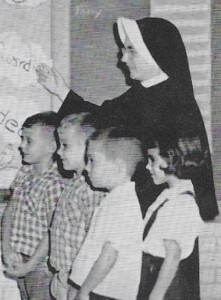 Whoever taught that wearing the scapular would save us from hell was treating that very nice symbol as magic. In the modern world, the “Poison P’s” are creating hell on earth. Being a practicing Catholic today means working to transform the “Poison P’s” however they are present in the circumstances of one’s life. They can be transformed – through faith, hope, and love. I think Mother Petronilla really knew the true purpose of a scapular: it was a very concrete reminder for us to be good.
Whoever taught that wearing the scapular would save us from hell was treating that very nice symbol as magic. In the modern world, the “Poison P’s” are creating hell on earth. Being a practicing Catholic today means working to transform the “Poison P’s” however they are present in the circumstances of one’s life. They can be transformed – through faith, hope, and love. I think Mother Petronilla really knew the true purpose of a scapular: it was a very concrete reminder for us to be good.
________________
Scapular photo used with permission: Copyright: <a href=’https://www.123rf.com/profile_echeverriurrealuis’>echeverriurrealuis</a>
Men of all ages, Straight or Gay, don’t walk to MROP, RUN!
 I recently made an amazing wilderness retreat for men developed by Fr. Richard Rohr, Franciscan priest and director of the Center for Action and Contemplation. The retreat is called Men’s Right of Passage (MROP). It was truly one of the most unique and wonderful events in which I have participated. I have been sending the following letter to male friends and family members to invite them to consider attending. (photo: Copyright: www.123rf.com/profile_kamchatka)
I recently made an amazing wilderness retreat for men developed by Fr. Richard Rohr, Franciscan priest and director of the Center for Action and Contemplation. The retreat is called Men’s Right of Passage (MROP). It was truly one of the most unique and wonderful events in which I have participated. I have been sending the following letter to male friends and family members to invite them to consider attending. (photo: Copyright: www.123rf.com/profile_kamchatka)
Dear Friends,
I’m writing to tell you about a five-day wilderness retreat I attended in the North Cascades called “Men’s Right of Passage (MROP).” The retreat was developed by Franciscan Father Richard Rohr. It is faith- oriented in that its reference point is from the monotheistic faith of Abraham whose God created all that is seen and unseen and who loves every human being as a beloved son or daughter. I have participated in outstanding events that have enriched my life and deepened my capacity to love God and neighbor. MROP is unlike anything I have ever done before. I won’t tell you much about it because I want you to attend it and don’t want to spoil any surprises. You can read about the retreat at this link: https://illuman.org/mrop/
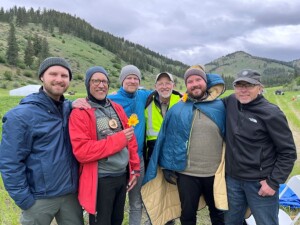 I will say this: MROP is held at different wilderness spots around the country. I attended one, 5 days, in the North Cascade Mountains backcountry, a place as beautiful and wild as any I’ve seen. The retreat’s purpose is to help men become healthy men, even with all the hurts and pains that life brings, and all the unhealthy behaviors that the culture’s toxic masculinity imposes. It had a perfect mixture of presentations, dramas, conversation in small groups, rituals, great food, campfires, rowdy singing, and lovely moments of quiet in nature.
I will say this: MROP is held at different wilderness spots around the country. I attended one, 5 days, in the North Cascade Mountains backcountry, a place as beautiful and wild as any I’ve seen. The retreat’s purpose is to help men become healthy men, even with all the hurts and pains that life brings, and all the unhealthy behaviors that the culture’s toxic masculinity imposes. It had a perfect mixture of presentations, dramas, conversation in small groups, rituals, great food, campfires, rowdy singing, and lovely moments of quiet in nature.
When I left the retreat on Sunday afternoon, I felt giddy with joy. I could hardly stop laughing and singing. I have not felt this alive, free, and content in a long, long time. This journey towards being a healthy man has been the trajectory that I have been on my entire adult life. MROP expanded that journey exponentially. You will find a schedule of upcoming MROP events at the above link. I urge you to find a date that works for you and set aside the time to attend.
Don’t walk to the next MROP; RUN TO IT!
If you have any questions or want to talk more about the retreat, let me know. I’m planting a seed, inviting you to consider participating in this life-transforming event. No matter how old you are, no matter your religious tradition or lack thereof, no matter your political persuasion – left, right, or in the middle – MROP can be the most healing, exhilarating, and meaningful event for men in which you will ever participate. Blessings! Robert
Good News/Bad News: The Vatican Responds to Yakima Investigation
Dear Friends, the investigation into our whistleblower complaint by the archbishop of Seattle is over. Here is a portion of a statement that I read to the investigator on October 8, 2020:
My experience has taught me a few things. #1. Sexual predators are here to stay. They are in our churches, families, schools, etc. We cannot filter them out. They will find a way to be with minors and vulnerable adults.
#2. The temptation to protect sexual predators is also here to stay. They will be our mentors whom we love, and we simply cannot believe the allegations made against us. Or, if we do, we will not want to ruin their careers over this one incident. Or, perhaps, they will be individuals like Cardinal McCarrick who have power to influence our careers; or, perhaps, they will know secrets on us that we do not want exposed.
# 3 Safe environment programs must equip Catholic employees, clergy and lay, and volunteers to address cover-up of sex abuse. Cover-up is the real culprit that turned a problem of offending clerics into an international scandal. Essential to equipping Catholic employees and volunteers in confronting cover-up in the church is the legal and emotional protection of whistle-blowers. Without that public commitment why would anyone speak out?
 Review: 8/1/19 – The CLM Board wrote Archbishops Sartain and Etienne to investigate Robert’s role as a whistleblower regarding the mishandling and cover-up of cases of clergy sex abuse by the Bishop of Yakima. Archbishop Sartain wrote a letter in response, dismissing the board’s concern.
Review: 8/1/19 – The CLM Board wrote Archbishops Sartain and Etienne to investigate Robert’s role as a whistleblower regarding the mishandling and cover-up of cases of clergy sex abuse by the Bishop of Yakima. Archbishop Sartain wrote a letter in response, dismissing the board’s concern.
8/28/19 – Robert wrote Archbishop Etienne (who replaced Archbishop Sartain) outlining his history of trying to expose the mishandling and cover-up of sex abuse in the Dioceses of Yakima and Seattle, and included evidence of retaliation.
11/15/19 – Archbishop Etienne wrote a response to Robert’s letter, stating that he was taking my concerns seriously and seeking consultation on his response.
2020 – Unbeknownst to us, the Archbishop initiated an investigation. He hired an investigator from Alaska, someone not known in Seattle or Yakima and therefore more likely viewed as being independent, to review documents and interview witnesses.
Oct 2020 – Robert was interviewed for almost two hours and provided the investigator with documents that he did not have and with names of witnesses with whom he had not yet spoken. Frank Murray of Yakima was also interviewed.
5/23/22 – I was asked to meet with the Archbishop and was told that I had to come alone, I could not take notes, and I could not see any documentation. At the meeting the Archbishop informed me that Pope Francis had been presented with the case and had then instructed the head of a congregation to issue a reprimand to Bishop Sevilla in accordance with Canon 1339 for causing “harm and scandal.” THAT’S THE GOOD NEWS!
The bad news is that this reprimand is private. That means neither the Pope, the Archbishop of Seattle, nor the Bishop of Yakima is going to tell anyone. I wrote the Archbishop a letter to thank him for taking our complaint seriously and initiating the investigation. Then I wrote this: The private nature of the Vatican’s reprimand of Bishop Sevilla leaves me and Frank Murray in the position of being whistleblowers once again…the issues which prompted our writing you in the first place remain unaddressed: Frank Murray and I have not been vindicated by Church leaders. Clergy and lay employees, and volunteers have yet to be assured that their jobs and reputations will be protected if they speak out and expose any behavior that suggests the possible abuse of minors or vulnerable adults and/or that such behavior is being covered-up. These issues, unaddressed, can also cause “harm and scandal” to the Church and continue the risks to youth and vulnerable adults.
